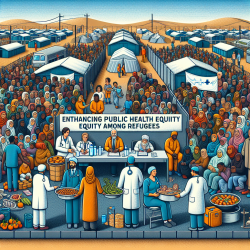Introduction
In the complex landscape of public health, ensuring equity for refugee populations poses significant challenges. The research article "Public Health Equity in Refugee Situations" by Leaning, Spiegel, and Crisp provides valuable insights into addressing these challenges. This blog aims to translate these insights into practical strategies for practitioners, with a focus on data-driven decision-making to enhance outcomes for refugee populations.
Understanding Public Health Equity in Refugee Contexts
Public health equity involves ensuring that all individuals, regardless of their socio-economic status or geographic location, have access to necessary health services. In refugee situations, this is complicated by factors such as limited resources, diverse health needs, and political constraints. The research emphasizes the need for ethical frameworks to guide resource allocation and decision-making.
Key Insights from the Research
- Health as a Priority: The research suggests prioritizing health within humanitarian budgets to alleviate pressure on resource allocation decisions. Practitioners are encouraged to advocate for increased health funding and to ensure that health services meet minimum standards.
- Resource Allocation: Distinctions between refugee and host populations, as well as within refugee groups, require careful consideration. Practitioners should aim for equitable service provision, taking into account demographic and health status differences.
- Transition and Exit Strategies: Long-term refugee situations necessitate sustainable health care solutions. Practitioners should work towards integrating refugee health services with national systems to ensure continuity and sustainability.
Practical Applications for Practitioners
Practitioners can enhance their skills by implementing the following strategies:
- Data-Driven Decision Making: Utilize data to identify health priorities and allocate resources effectively. This includes tracking health outcomes and adjusting strategies based on evidence.
- Collaboration and Advocacy: Work with stakeholders, including governments and NGOs, to advocate for policies that support health equity. Collaboration can lead to more comprehensive and sustainable health solutions.
- Continuous Learning: Stay informed about the latest research and best practices in refugee health. Engage in professional development opportunities to enhance skills and knowledge.
Encouraging Further Research
The complexity of public health equity in refugee situations calls for ongoing research. Practitioners are encouraged to contribute to this body of knowledge by conducting studies, sharing findings, and participating in discussions on ethical and practical challenges.
Conclusion
By applying ethical frameworks and data-driven strategies, practitioners can play a crucial role in improving health outcomes for refugee populations. For those interested in exploring this topic further, I highly recommend reading the original research paper, which provides a comprehensive analysis of public health equity in refugee situations.
To read the original research paper, please follow this link: Public health equity in refugee situations.










